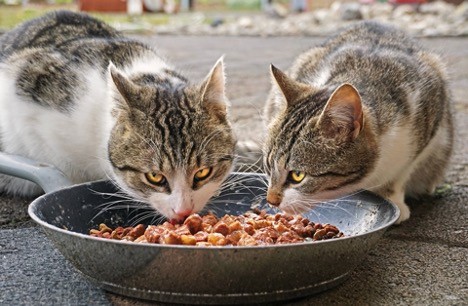Connect with a verified veterinarian in minutes. Licensed vets are available 24/7 to answer your questions. No need to worry about your furry family member.
Do you have pets and want to ensure they are getting the proper nutrition? Maintaining your pet’s health is essential, including ensuring they’re eating the right food. There are a lot of different pet foods on the market, so it can be tough to know which one is right for your furry friend. In this article, we will discuss the basics of pet nutrition and give tips on choosing the right food for your pet. Let’s get started.
Go for a Raw Diet
One of the best ways to ensure your pet’s nutrition is on the right track is to feed them a raw diet. A raw diet consists of fresh, whole foods free of preservatives and additives. This diet contains all the essential vitamins and minerals your pet needs, antioxidants, fatty acids, and other important nutrients, making them more beneficial to your pets. For instance, the benefits of raw dog food include improved digestion, increased energy levels, and a shinier coat. They also help reduce allergies and provide better dental health.
Raw diets are also cheaper than commercial pet foods, as you can purchase fresh ingredients in bulk with the same nutrition content. Plus, they’re easy to prepare with just a few simple steps. Consider your pet’s age, size, and activity level when deciding how much to feed them. However, if you would rather skip the mess of preparing raw meat for your dog, you can find a suitable selection at Petzyo which provide biologically appropriate raw food (BARF) dog food.
Buy High-Quality Premium Brands
Another way to ensure your pet is getting the proper nutrition is to invest in premium pet food brands. Premium brands have higher-quality ingredients than most commercial products and are often more nutrient-rich. Additionally, they usually contain more proteins, fats, and carbohydrates than other brands. Most premium brands also have fewer fillers, which means more nutrients for your pet.
However, not all premium brands are created equal. Do your research to find the best option for your pet’s needs. Check out customer reviews and compare labels to ensure you get the best nutrition possible. If possible, speak to your veterinarian for advice on the best options.

Review symptoms, medications & behavior to keep your pets healthy with a Vet Online in just minutes.
Ask a Vet Live NowLook for Certified Products
When selecting food for your pet, look for products certified by a reputable organization such as AAFCO (Association of American Feed Control Officials). This organization sets standards for pet food, including minimum nutrient content, labeling requirements, and safety assurance. Products certified by AAFCO have met these standards and are more likely to provide the nutrition your pet needs.
Also, check the ingredients list of any pet food you purchase. The first five ingredients should be proteins, fats, and carbohydrates that provide essential nutrients for your pet. Avoid foods with artificial flavors, colors, or preservatives which are not beneficial to your pet’s health.
Choose the Right Food for Your Pet
Not all pets are created equal, so pick a food tailored to your pet’s specific needs. Puppies and kittens need more calories than adult pets, so look for foods designed for puppies or kittens. Senior pets may benefit from low-calorie diets, which help them maintain their weight and energy levels.
Special diets are also available for pets with allergies, gastrointestinal issues, or other health concerns. Speak to your veterinarian for the best food for your pet’s needs. They can recommend a food that meets your pet’s nutritional requirements. For instance, they may suggest a food specifically designed for pets with sensitive stomachs or allergies.
Feed the Right Amount
Portion control is important when feeding your pet. Overfeeding can lead to obesity, which can cause serious health problems such as diabetes and joint pain. Underfeeding may result in malnutrition, so feeding your pet the right amount of food according to their size and activity level is essential.
Speak to your vet for recommended portion sizes, or refer to the packaging of the food you purchase. If you are unsure, start with smaller portions and adjust accordingly. For instance, a puppy cannot eat as much as an adult dog so they will require smaller servings.
Regular Check-Ups
Although feeding your pet the right food is important for their health, regular check-ups at the vet are just as essential. A veterinary exam can help identify any nutritional deficiencies or other potential health issues before they become serious.
They can also recommend changes to your pet’s diet or provide guidance on which supplements are best for them. For instance, dogs with joint pain may benefit from supplements such as glucosamine to help reduce their discomfort.
Feeding your pet the right food and providing regular check-ups at the vet are essential for their health and well-being. Investing in premium brands, looking for certified products, choosing a food tailored to your pet’s specific needs, and feeding them the recommended portion size will ensure they get the nutrition they need. Regular check-ups at the vet can then help identify potential health concerns and provide advice on any dietary supplements your pet may need. By following these steps, you can ensure that your pet’s nutrition is always on track.
Connect with a verified veterinarian in minutes. Licensed vets are available 24/7 to answer your questions. No need to worry about your furry family member.

Tom
Tom has always loved to write since he was little - he wanted to be either a writer or a veterinary doctor, but he ended up being a professional writer while most of his works are based on animals. He was born in San Francisco but later moved to Texas to continue his job as a writer. He graduated from the University of San Francisco where he studied biotechnology. He is happily married and a soon to be father!
Review symptoms, medications & behavior to keep your pets healthy with a Vet Online in just minutes.
Ask a Vet Live Now


